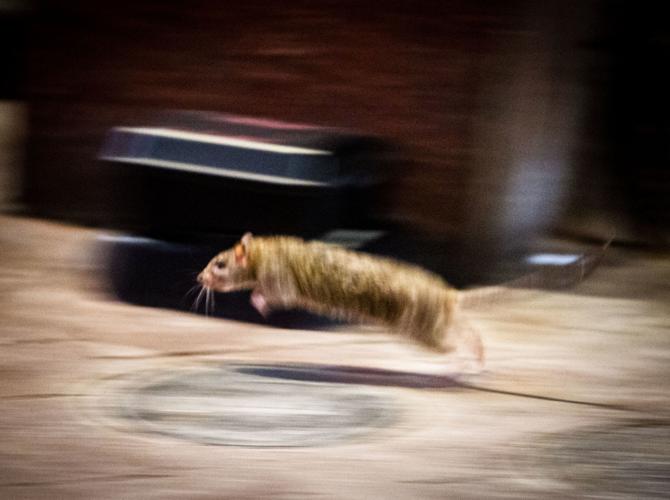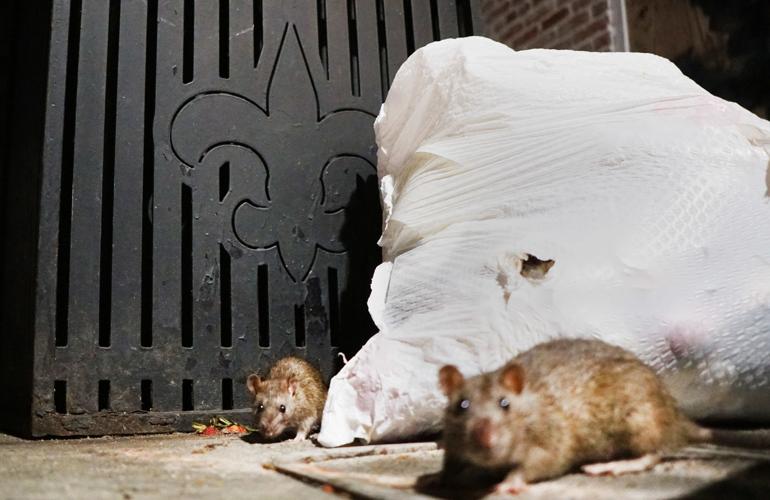The city has begun putting poisoned rat bait into sewers throughout the French Quarter and will fan out from there as more rodents take to the streets to find food that has now become scarce due to the coronavirus response.
Claudia Riegel, director of the New Orleans Mosquito, Termite and Rodent Control Board, said Monday the effort is much like any other time the city tries to get out in front of a major event, and she stressed that the city is being proactive in its approach.
A viral video by Charles Marsala showing more than a dozen rats congregating in the middle of a vacant Bourbon Street last week shed light on an emerging phenomenon: With many restaurants closed, rats accustomed to getting food out of public view are having to forage more widely, and empty streets lined with residential garbage cans are the next closest source.
"What we have seen is these (social-distancing) practices are driving our rodents crazy," Mayor LaToya Cantrell said on Sunday, while addressing the importance of protecting the local homeless population that shares the streets with the increasingly brazen vermin.
To highlight the city's efforts, the media were alerted Monday morning that Riegel and city rodent control workers would be at the corner of Bourbon and Canal streets.
“We are seeing in some places elevated activity, and that’s why we are here,” Riegel said. “Our goal is for the next couple of months to hit it real hard here in the French Quarter and other commercial areas.”
Riegel said crews will be coming through once a week.
"These rats are hungry, so we want them to eat our bait," she said. "We're going to put a lot of pressure for at least the next month, or (until) we start to see consumption tail off."
Riegel said there have been no reports of anyone being bitten, and her office has not gotten many calls from residents saying there is a problem, but "this is pretty new; it's only been a week and a half."
Riegel said residents should not set trash bags on the street and should take other precautionary steps to avoid closer contact with rodents. Those steps include not leaving pet food outside, keeping sidewalks and yards free of food, keeping fruit trees picked and not feeding birds.
“We really need everybody to look at how they are handling their trash and dispose of it properly,” she said.
Riegel urged residents to call 311 if they see rats in their area because they are a danger to public health.
“There are pathogens in these rodents," she said. "Fortunately … we don’t have many disease cases actually related to rodents, but the potential is there.”
In addition to lowering the bait into the sewers that rats use for cover, workers are also putting black-box bait stations about the size of a shoe box along the sidewalk.
The poison, a blood anticoagulant that causes organ failure in rats that have eaten it, is suspended out of reach of people and pets and out of the water in the storm drains.
Riegel said the city typically baits the sewers about once every quarter, but it does so before major events, meaning this deployment is not that unusual.
The rats people see in the French Quarter and throughout the city tend to be two varieties: roof rats and Norway rats.
Roof rats are smaller, have narrower features and live in trees, typically coming into homes from above. Norway rats are the larger, burrowing rats that live along the banks of the Mississippi River and tend to raid nearby streets in search of food.
Riegel also warned residents that mosquito season is coming, and the usual preventative measures to limit West Nile virus should be followed, such as not letting water pool up in yards and staying in at night or using bug spray.
She noted coronavirus is not transmitted by mosquitoes. The disease is respiratory, not blood-borne.
Stay with The Times-Picayune| New Orleans Advocate as this story develops.













